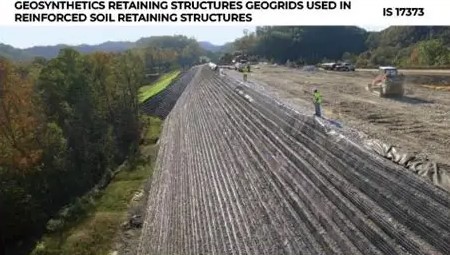Geo Textiles
Geogrids Used in Reinforced Soil Retaining Structures (17373:2020)
Strategic Recommendations for Geogrids for Reinforced Soil Retaining Structures
Engage Early with BIS & Labs
Start BIS licensing for IS 17373:2020 ahead of the 1 Jan 2024 deadline. Conduct tensile, durability, and creep tests in BIS-recognized labs.
Partner with Compliance Experts
Collaborate with the ERA Compliance Team for license filing, documentation, and ISI marking readiness.
Contact ERA Support Team
📧 cs@eraglobal.co.in | 📞 +91 9599296331 | 💬 WhatsApp
Guidance on QCO compliance, product testing, and export exemptions.
Track Notifications & Circulars
Subscribe to the ERA Newsletter for updates on Geo Textiles (QCO), 2022, S.O. 1706(E), S.O. 2331(E), and MoT circulars.
Do a Gap Assessment
Review existing geogrid designs for tensile strength, junction efficiency, and environmental resistance to ensure IS 17373:2020 compliance before enforcement.

| Section | Details |
|---|---|
| Product Name | Geogrids Used in Reinforced Soil Retaining Structures |
| IS Standard | IS 17373:2020 |
| Title of IS | Geosynthetics – Geogrids Used in Reinforced Soil Retaining Structures – Specification |
| Quality Control Order | Geo Textiles (Quality Control) Order, 2022 |
| Notification & Amendments |
- Notified via S.O. 1706(E), dated 10 April 2023 - Amended via S.O. 2331(E), dated 24 May 2023 - Final enforcement via MoT Order dated 6 Oct 2023 |
| Final Enforcement Date | 1 January 2024 |
| Objective & Scope | To regulate the performance and quality of geogrids used for soil reinforcement in retaining structures such as MSE walls, bridge abutments, and flyovers. |
| Products Covered | Uniaxial geogrids used for soil reinforcement in reinforced soil retaining structures, embankments, ramps, and similar load-bearing applications. |
| Exemptions | Products manufactured exclusively for export are exempt from BIS certification and ISI marking. |
| Industries Impacted |
- Highway & Bridge Construction - Retaining Wall Systems - Railway & Metro Infrastructure - Geosynthetics Manufacturing Sector |
| Mandatory Compliance | BIS license required under Scheme-I of BIS (Conformity Assessment) Regulations, 2018. ISI marking mandatory for all domestic supply. |
| Next Steps for Stakeholders | Apply for BIS certification, conduct product testing in BIS-recognized labs, affix ISI mark before domestic sale/distribution. |
| Legal Framework & Enforcement | Enforced under the BIS Act, 2016. BIS is the nodal authority for certification and enforcement. |
| Penalties for Non-Compliance | Includes product seizure, fines, cancellation of license, or imprisonment up to 2 years, or both. |
| Conclusion | From 1 January 2024, geogrids used in reinforced soil retaining structures must conform to IS 17373:2020 and be BIS certified with ISI marking. |
| References / Annexures |
- QCO: S.O. 1706(E) [10 Apr 2023] - Amendment: S.O. 2331(E) [24 May 2023] - Enforcement Order: MoT [6 Oct 2023] |
Ready to start your certification journey?
Let us help you navigate regulatory challenges and achieve certification with ease. Leave us your details, and we’ll get back to you—or request a free consultation today.
Get in touch with us today
Notification
Geogrids Used in Reinforced Soil Retaining Structures have been notified under the Geo Textiles (Quality Control) Order, 2022, via S.O. 1706(E) dated 10 April 2023. The QCO was amended by S.O. 2331(E) dated 24 May 2023, and the final enforcement date was confirmed as 1 January 2024 by the Ministry of Textiles through its order dated 6 October 2023.
Overview
These geogrids are high-strength synthetic mesh structures used to reinforce soil in critical applications like mechanically stabilized earth (MSE) retaining walls, flyover abutments, ramps, and elevated embankments. They provide essential tensile resistance, increase stability, and enable steeper wall construction under heavy loading.
Objective & Scope
IS 17373:2020 prescribes performance specifications for uniaxial geogrids used in reinforced soil retaining systems. Key parameters include tensile strength, junction efficiency, long-term creep behavior, durability, and environmental resistance for prolonged field performance.
Products Covered
The standard applies to uniaxial polymeric geogrids (commonly HDPE, PET, or PP), used in:
- Reinforced retaining walls
- Bridge and flyover approach ramps
- MSE wall facings
- Embankment and slope stabilization systems
Exemptions Provided
Only those geogrids manufactured exclusively for export are exempt from BIS certification and ISI marking under this QCO.
Industries Impacted
- Road & Bridge Infrastructure – For critical vertical and near-vertical earth retention systems
- Railways & Urban Metro Projects – In flyover ramps, elevated corridors, and cut-fill zones
- Geosynthetics Industry – As primary manufacturers and suppliers of soil reinforcement products
Mandatory Compliance Requirements
Effective 1 January 2024, it is mandatory for all relevant products to:
- Conform to IS 17373:2020
- Be certified under Scheme-I of the BIS (Conformity Assessment) Regulations, 2018
- Carry the ISI mark on all packaging for domestic supply
Next Steps for Stakeholders
- Submit applications for BIS certification
- Test products at BIS-recognized laboratories
- Begin ISI-marked supply chain before enforcement
- Maintain documentation for exempt export-only batches
Legal Provisions, Enforcement & Penalties
Under the BIS Act, 2016, BIS is authorized to enforce compliance, conduct inspections, suspend licenses, and initiate legal proceedings. Penalties for violation may include:
- Seizure of products
- Suspension or cancellation of BIS license
- Fines or imprisonment up to 2 years, or both
Conclusion
From 1 January 2024, all geogrids used in reinforced soil retaining structures must comply with IS 17373:2020 and carry valid BIS certification. This mandatory standard ensures quality, structural safety, and long-term durability of key infrastructure components in India.
Ready to start your certification journey?
Let us help you navigate regulatory challenges and achieve certification with ease. Leave us your details, and we’ll get back to you—or request a free consultation today.
